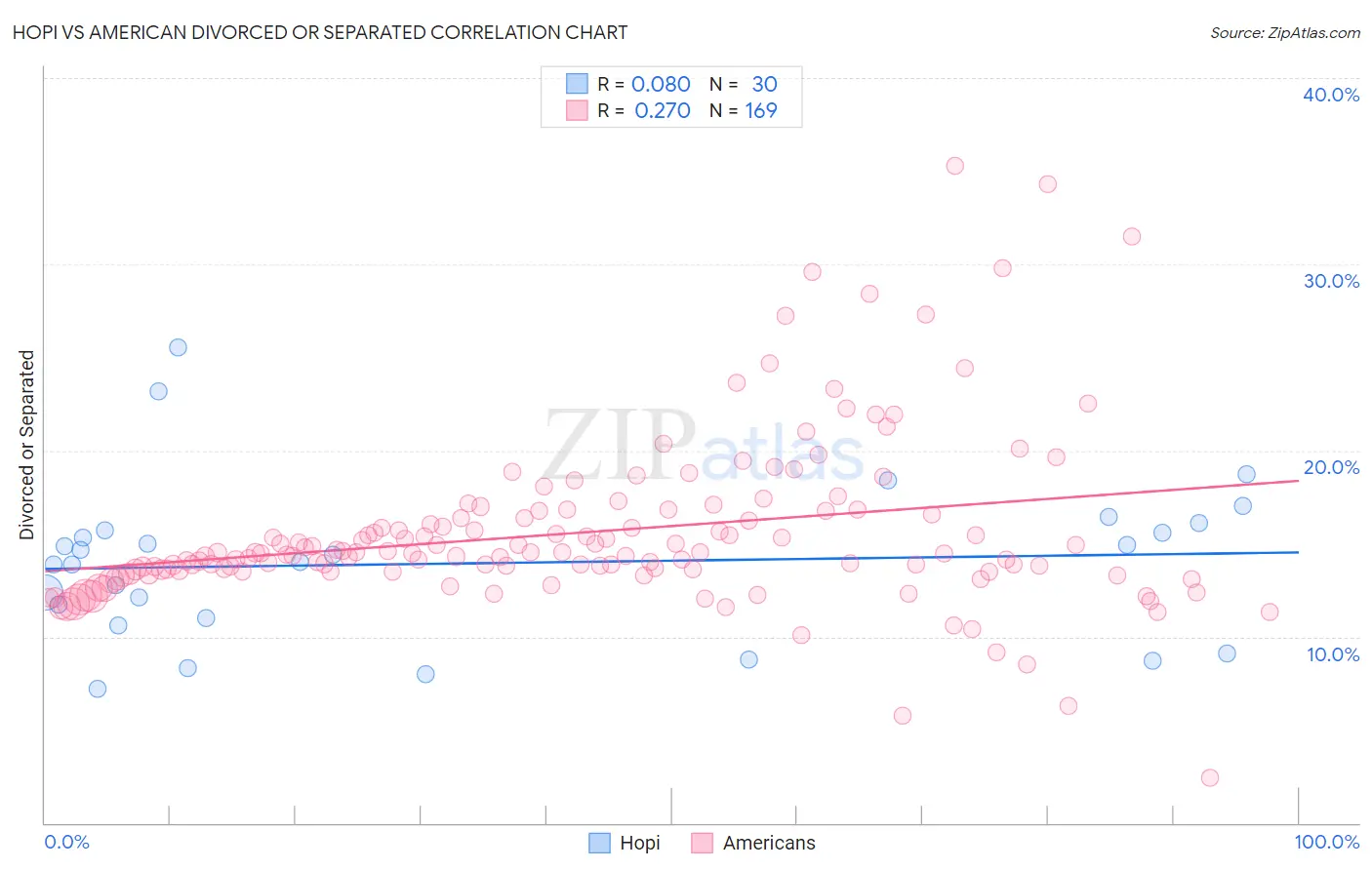Hopi vs American Divorced or Separated
COMPARE
Hopi
American
Divorced or Separated
Divorced or Separated Comparison
Hopi
Americans
13.2%
DIVORCED OR SEPARATED
0.0/ 100
METRIC RATING
304th/ 347
METRIC RANK
13.2%
DIVORCED OR SEPARATED
0.0/ 100
METRIC RATING
309th/ 347
METRIC RANK
Hopi vs American Divorced or Separated Correlation Chart
The statistical analysis conducted on geographies consisting of 74,740,168 people shows a slight positive correlation between the proportion of Hopi and percentage of population currently divorced or separated in the United States with a correlation coefficient (R) of 0.080 and weighted average of 13.2%. Similarly, the statistical analysis conducted on geographies consisting of 581,440,230 people shows a weak positive correlation between the proportion of Americans and percentage of population currently divorced or separated in the United States with a correlation coefficient (R) of 0.270 and weighted average of 13.2%, a difference of 0.57%.

Divorced or Separated Correlation Summary
| Measurement | Hopi | American |
| Minimum | 7.2% | 2.4% |
| Maximum | 25.5% | 35.3% |
| Range | 18.3% | 32.9% |
| Mean | 13.9% | 15.6% |
| Median | 14.2% | 14.5% |
| Interquartile 25% (IQ1) | 11.0% | 13.5% |
| Interquartile 75% (IQ3) | 15.7% | 16.6% |
| Interquartile Range (IQR) | 4.7% | 3.1% |
| Standard Deviation (Sample) | 4.2% | 4.6% |
| Standard Deviation (Population) | 4.1% | 4.6% |
Demographics Similar to Hopi and Americans by Divorced or Separated
In terms of divorced or separated, the demographic groups most similar to Hopi are Chippewa (13.2%, a difference of 0.050%), Cape Verdean (13.1%, a difference of 0.13%), Immigrants from Venezuela (13.1%, a difference of 0.15%), Tlingit-Haida (13.2%, a difference of 0.22%), and Alaskan Athabascan (13.1%, a difference of 0.25%). Similarly, the demographic groups most similar to Americans are Ottawa (13.2%, a difference of 0.010%), African (13.2%, a difference of 0.020%), Sioux (13.2%, a difference of 0.040%), French American Indian (13.2%, a difference of 0.10%), and Tlingit-Haida (13.2%, a difference of 0.35%).
| Demographics | Rating | Rank | Divorced or Separated |
| Nicaraguans | 0.0 /100 | #296 | Tragic 13.0% |
| Natives/Alaskans | 0.0 /100 | #297 | Tragic 13.0% |
| Venezuelans | 0.0 /100 | #298 | Tragic 13.0% |
| Immigrants | Jamaica | 0.0 /100 | #299 | Tragic 13.0% |
| Immigrants | Cabo Verde | 0.0 /100 | #300 | Tragic 13.1% |
| Alaskan Athabascans | 0.0 /100 | #301 | Tragic 13.1% |
| Immigrants | Venezuela | 0.0 /100 | #302 | Tragic 13.1% |
| Cape Verdeans | 0.0 /100 | #303 | Tragic 13.1% |
| Hopi | 0.0 /100 | #304 | Tragic 13.2% |
| Chippewa | 0.0 /100 | #305 | Tragic 13.2% |
| Tlingit-Haida | 0.0 /100 | #306 | Tragic 13.2% |
| French American Indians | 0.0 /100 | #307 | Tragic 13.2% |
| Ottawa | 0.0 /100 | #308 | Tragic 13.2% |
| Americans | 0.0 /100 | #309 | Tragic 13.2% |
| Africans | 0.0 /100 | #310 | Tragic 13.2% |
| Sioux | 0.0 /100 | #311 | Tragic 13.2% |
| Blackfeet | 0.0 /100 | #312 | Tragic 13.3% |
| Immigrants | Nicaragua | 0.0 /100 | #313 | Tragic 13.3% |
| Yaqui | 0.0 /100 | #314 | Tragic 13.3% |
| Spanish Americans | 0.0 /100 | #315 | Tragic 13.3% |
| Tsimshian | 0.0 /100 | #316 | Tragic 13.3% |